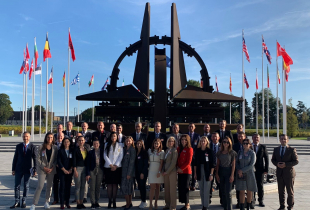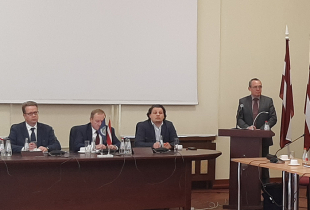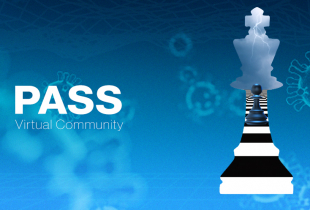
Marshall Center Hosts Central Asia, Russia Regional Alumni Virtual Event
By Alumni Programs
College of International and Security Studies
George C. Marshall European Center for Security Studies
GARMISCH-PARTENKIRCHEN (Sept. 17, 2020) – The Alumni Programs at the George C. Marshall European Center for Security Studies conducted a Virtual Central Asia and Russia Regional Alumni Webinar on “Regional Cooperation during COVID-19 and External Assistance” Sept. 16.
This virtual event was in conjunction with the GCMC alumni associations of Russia and Kazakhstan, the U.S. Embassy in Ashgabat and Turkmenistan Ministry of Foreign Affairs.
“The event is part of a continuing program to encourage alumni from Central Asia and Russia to enhance their participation in Marshall Center programs, to discuss important security issues and to encourage the alumni security community network to grow and flourish,” said Chris Burelli, director of Marshall Center’s Alumni Programs.
Seven participants from multiple ministries in Kazakhstan, Turkmenistan and Russia took part in the conference.
In his opening remarks, the Director of the European Security Seminar East, Dr. Sebastian von Münchow greeted the participants and provided an overview of the college’s work under COVID-19 conditions. He also briefed the alumni on recent German and European efforts to control the coronavirus.
Marshall Center faculty representatives Dr. Gregory Gleason and Dr. Pál Dunay gave the keynote presentations. Their presentations examined how different governments in the region cooperated internationally in solving multiple problems generated by the coronavirus pandemic.
Other speakers were Col. Boris Korolev, Yury Ozerov, Dr. Anna Gussarova, Dr. Kuralai Baizakova, Dr. Zhulduz Baizakova, and Hemra Amannazarov.
“Nations need to work together, and not separate their populations from each other,” said Gleason.
“Cultural traditions in the Former Soviet Union and Eastern Europe allowed their populations to more stringently adhere to anti-virus gestures, and enable them to slow down the spread in relation to many other nations in the western world,” said Dunay.
“The regional alumni events are a way for us to show our continued support and helps to strengthen the alumni network as an integral part of the alumni program and mission of the Marshall Center,” Burelli said. “During these events, we are also able to update our alumni on new initiatives at the Marshall Center and future opportunities for alumni to participate in our programs.”


